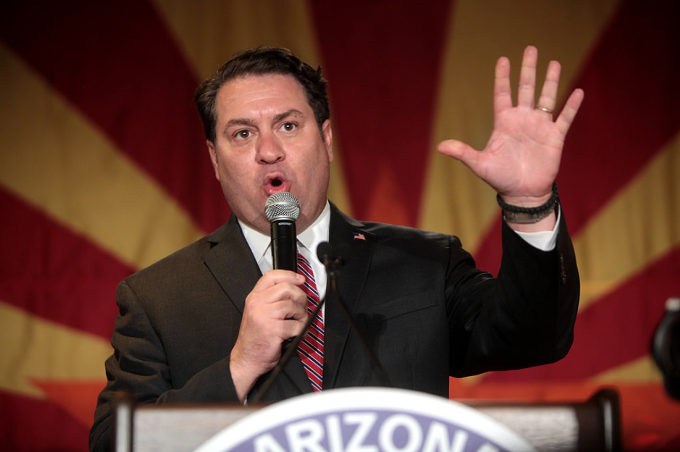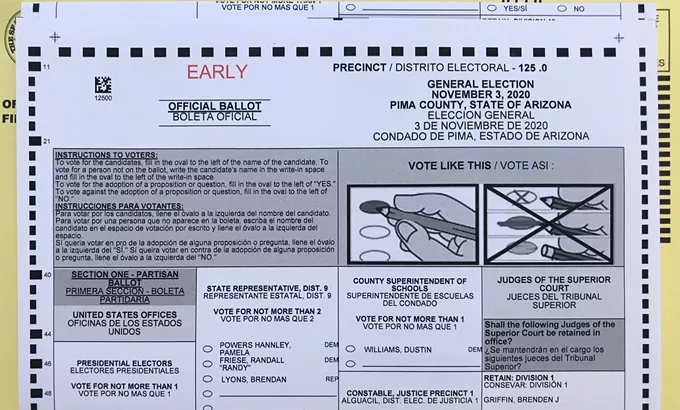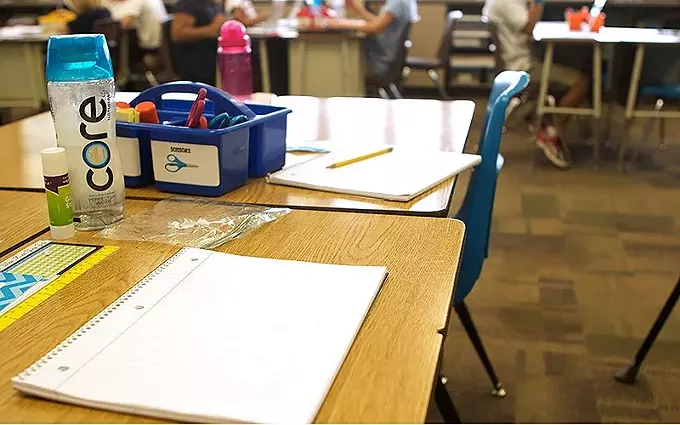Friday, February 11, 2022

If the lawyer representing you struck an agreement with the State Bar over ethics complaints, you’d want to know what exactly they agreed to do to fix their ethical problems.
Arizona Attorney General Mark Brnovich, by virtue of his position as the state’s top elected lawyer, represents all Arizonans in court. Yet we have no idea what his recent Bar “diversion agreement” entails because he won’t say.
Brnovich entered the diversion agreement after the Arizona Board of Regents and Arizona Secretary of State Katie Hobbs filed ethics complaints against Brnovich.
The regents say Brnovich acted unethically by suing the universities while also representing them as a client. And Hobbs said the AG’s office would act counter to her instructions and acting against her office.
Diversion is an alternative to discipline, provided that an attorney completes the terms set out by an agreement, the Arizona Supreme Court’s guidelines for the program say. It is meant to protect the public and improve attorneys’ work through “education, remedial and rehabilitative programs so that attorneys modify practices, procedures or other conduct” that doesn’t comply with Bar rules.
Such agreements are confidential under Supreme Court rules. But Brnovich could waive that confidentiality — and he’s the only one who can. The Bar can’t release the information, and the parties who filed complaints don’t know the terms of agreements either.
Thursday, February 10, 2022
All the best grifters are moving to New Mexico ... From Adios Arpaio to Adios Sinema ... It's a nonviolent army, he swears.
New details are trickling out as reporters, investigators and prosecutors continue their quest to piece together who was doing what, where and when in the weeks between the election and Jan. 6. And of course, there’s always an Arizona angle.
Politico yesterday shed some additional light on those never-enacted executive orders pushed by Michael Flynn and his crew of Arizona audit-funding cronies to have the military seize voting machines, including one fascinating Arizona detail: “Metadata on the document says it was created by a user named Christina Bobb.”
Yes, it seems like it’s that Christina Bobb. She’s also an ASU grad (go Sun Devils!).
The timing of Brnovich’s White House visit is important to note: Arizona’s fake electors sent their fake documents to Congress four days after that meeting. Then there’s yesterday’s scoop from the Yellow Sheet Report, which dug up public records from attorney general/U.S. Senate candidate Mark Brnovich showing he was, in fact, at the White House on December 10 and 11, 2020, with a crew of Republican attorneys general who had backed a Texas lawsuit seeking to decertify the 2020 election.OAN’s Christina Bobb was go-between for Guiliani & AZ Senate President Karen Fann, per emails. Also raised money for partisan AZ audit. Also chief propagandist. https://t.co/9dgmJCeX4p
— Brahm Resnik (@brahmresnik) February 9, 2022
(The Republic had previously noted that former Trump Chief of Staff Mark Meadows attempted to contact Brnovich after the election through a member of Congress, but Brnovich’s office dodged questions about whether they actually spoke.)
Which raises all sorts of questions, like what exactly was Brnovich doing at the White House? What did he speak to the president about? Did the fake electors come up? Did Brnovich know that was coming? Is that why he’s not investigating fake electors while he’s chasing the Cyber Ninjas conspiracies down the drain? And, of course, how’s that audit investigation coming?
But as usual, Brnovich’s office isn’t talking.
Meanwhile, Arizona Daily Star columnist Tim Steller penned a scathing piece in which he became the second major newspaper columnist in the state to call on Brnovich to resign.
A crazy thing about the case I made today for @generalbrnovich to resign is all the stuff I had to leave out, but which make the case stronger. https://t.co/DWD5W6AWUy
— Tim Steller (@senyorreporter) February 9, 2022
Steller focused on Brnovich’s most recent attempts to use “the power of the position he holds to establish himself as a super-Trump Republican” in the Senate race. That included his recent opinion that Gov. Doug Ducey can use war powers to send troops to the U.S.-Mexico border, and his tweets in solidarity with Canadian truckers who have been illegally shutting down major U.S.-Canada crossings in defiance of that country’s vaccine mandates.“If he doesn’t bring an indictment, some Republican voters and interests will punish him. If he does, any charges will appear to be political performance. It’s a no-win situation that neither he, nor we as Arizonans, should be in. The solution is for Brnovich to resign,” Steller wrote.
tweet this
Of course, all that brings into question whether Brnovich can handle the pressure placed upon him from Trump and the GOP base to “put the nunchucks down and pick up the handcuffs and arrest people” for election fraud, as Kari Lake once put it, while trying to impartially investigate the claims in the state Senate’s audit of the 2020 election.
And speaking of the audit, it seems the grift continues. New Mexico’s conservative Otero County is paying $50,000 to audit, via door-to-door canvassing, its own election, which Trump won in a landslide.
“Dr. Shiva” Ayyadurai, who was also on contract in the Arizona audit and shared easily debunked findings, got the contract, which the actual state auditor is now investigating, the Daily Beast reports.
To keep track of all the Arizona angles (so many!) of political stories, sign up below to subscribe to our daily newsletter.
Government at the speed of government: If you’re a regular watcher of the Arizona Legislature, you probably noticed that the Request to Speak system is melting down more than usual this year. It’s a pain for people who want to track bills and register their support or opposition to them because RTS is a critical tool for public engagement in the legislative process. Legislative Council, the nonpartisan group that keeps the trains running at the Capitol, plans to repair the system sometime soon, possibly by the time you read today’s newsletter. Let’s hope! Fingers crossed that director Mike Braun gets to keep his job:
Looks like system is going online now. Leg Council director Mike Braun told me they’re going to “pray to God it works, because if it doesn’t, if you call this number again, I’m sure you won’t get me.” https://t.co/EAFrRUAOCi
— Wayne Schutsky (@WayneSchutsky) February 9, 2022
Back at it again with a bill roundup:
Teachers say a bill requiring them to put curriculum online and institute parental reviews for certain materials will make their work harder and increase scrutiny.
Arizona Sen. Tyler Pace helped stop a bill in committee yesterday that would have banned gender-affirming health care.
For a roundup within this roundup, here’s a rundown of the environmental bills moving through the Legislature.
The bill that would’ve required a “harmful content” filter on devices died in committee yesterday (story complete with wretched stock image).
A voucher expansion bill is trucking along on party lines.
Everyone’s blaming everyone else: A notice of claim filed by three former assistant police chiefs in Phoenix who were demoted alleges that Phoenix Police Chief Jeri Williams lied when she said she wasn’t aware of plans to charge protesters as a street gang, ABC15’s Dave Biscobing reports. It’s one of many lawsuits stemming from the fallout of the gang charges and Biscobing’s reporting on them.
Were we ever, though?: Arizona isn’t doing full-on contract tracing of all COVID-19 positives these days because cases are so high and the public’s response to efforts to reach out have declined, KJZZ’s Katherine Davis-Young reports. Instead, tracing focuses on schoolchildren and people over age 80 because contact tracing in those populations has a higher impact.
What’s his is yours: Mohave County Supervisor and former best-mustache-in-the-
One way to clear a backlog: To manage lengthy waits for work permits, the U.S. Citizenship and Immigration Services will extend the length of time that six types of permits remain valid in order to reduce the number of applications and wait times, the Republic’s Rafael Carranza reports.
Prankster who went viral for city council rap about vaccinations (@alexstein99) called in to Phoenix this morning to say a council member is having an affair with his wife.
— Jen Fifield (@JenAFifield) February 9, 2022
They let him talk the Full. Three. Minutes. https://t.co/1dZKa4Xtsg pic.twitter.com/BakeowW1op
Speed racers no more: Phoenix Police say they’re seeing less street racing in town these days, and their officers spend less time on the problem since they formed a street racing task force and the city passed an ordinance to seize cars used in such racing last year, KJZZ’s Christina Estes reports.

|
Like finding water in the desert: Part of a massive development 20 years in the making is being built now on state trust land called the Superstition Vistas, but finding enough water to serve the full development, which could be as large as 900,000 people, makes the project and its expansion more difficult, the Republic’s Joshua Bowling reports.
Redo it: Critics of a natural gas plant expansion in Coolidge want the Salt River Project to start over with its proposal. A state committee called the Arizona Power Plant and Line Siting Committee should reject the utility’s plans, Ryan Bentz argues in an op-ed for the Republic.
Still two years away: One group is already raring to go for the eventual 2024 Democratic primary against U.S. Sen. Kyrsten Sinema. Voto Latino started an “¡Adiós Sinema!” campaign to try to raise money for a Sinema opponent in the 2024 cycle, the Republic’s Javier Arce reports. The group says Sinema’s actions have had a negative effect on the Latino community.
Smoke safely: If you’re curious about what the weed you smoke is tested for before you consume it, the Arizona Daily Star’s Edward Celaya walks you through the state requirements for testing on potency and safety.
House Bill 2224, which would make it a crime to declaw a cat, passed the House Government Committee and is heading to the House floor for a vote.
Animal veterinarians explained to the committee how declawing involves more than just cutting a cat’s nails: You have to amputate a piece of their fingers, and it can really mess them up.
Capitol Media Services’ Howie Fischer has all the “gruesome” details, but the highlight is probably Republican Rep. Frank Carroll’s astute declaration that “cats are not citizens.”
QAnon dude Ron Watkins plays cowboy in a new video about his campaign for Congressional District 2, and if you’ve been an Agenda reader for more than five minutes, you know this is something we love/hate.
In a cowboy hat, wearing jeans and a suit jacket, standing in front of a barbed wire fence, Watkins does his best “The Good, the Bad and the Ugly” impression. He implores supporters to sign up as volunteers with the “CMZ Army,” presumably a reference to CodeMonkeyZ, Watkins’ handle on several platforms.
He helpfully notes in the video that his “army” is nonviolent and made up of grassroots volunteers. The website he directs people to, cmz.army, goes even further to clarify his army is not an army: “CMZ ARMY is not associated with, or sponsored by, any national or international government agency or branch of the armed forces in any nation.”Ron Watkins has just posted a new video.
— 2022 Karma (@2022_Karma) February 9, 2022
I can’t even take this seriously at this point. pic.twitter.com/2gFmjY2ybx
Wednesday, February 9, 2022
WASHINGTON – The Sonoran desert tortoise has been denied endangered species status for a second time after a 14-year battle waged by advocates to protect the “ancient, iconic species of the desert.”
The U.S. Fish and Wildlife Service said Tuesday that after a scientific review of the Arizona tortoise and its habitat, it determined that endangered species protection was “not warranted,” noting the current population of adults estimated to be in the hundreds of thousands.
But environmental groups, which had sued in hopes of forcing the designation, said the tortoise needs protection, as its habitat is threatened by grazing, increased fire risk and housing developments, among other things.
“We hope that the Fish and Wildlife Service is correct … but we’re going to request more information from the agency and we’re going to carefully go over that and look at their models, look at the science they say they’re using and make sure that they’ve done the job they’re supposed to do,” said Cyndi Tuell, the Arizona and New Mexico director for the Western Watersheds Project.
It and the group WildEarth Guardians questioned the government’s analysis and said they will continue to advocate for the tortoise’s protection.
The same two groups sued the service in 2020 in an effort to get it to reverse its 2015 decision that came to the same conclusion on the health of the species. That suit led to the review that ended with Tuesday’s status decision.
An FWS statement on the decision said that “populations remain stable, with estimates in the hundreds of thousands of adult tortoises.” It acknowledged that there are several potential threats to the species, but that none of them pose an immediate threat.
“While several of these threats, mainly development and drought, may increase in scope or severity over time, the species and its associated habitat are projected to remain at levels that do not threaten the survival of the Sonoran desert tortoise in the foreseeable future,” said an agency statement.
The service also noted that large parts of the tortoise’s range is on federal or tribal lands that are managed for its protection.
The environmental groups said the service relied on predictive modeling and data not available to the public to conduct its analysis, painting a rosier picture of the current and future situation of the tortoise.
“The Service’s announcement asserts that 29 percent of the species’ range in Arizona is on publicly-owned lands managed specifically ‘for the benefit of wildlife,’” said a joint statement from the groups. “This includes the Sonoran Desert National Monument where the Bureau resisted conducting a thorough or adequate analysis of the impacts of livestock grazing.”
Tuell also said the FWS ignored data that suggests the border wall will have a negative impact on the tortoise species, instead reporting that it would be impossible to know what impact a wall would have.
“The Fish and Wildlife Service knows that the border wall has basically entirely cut off the tortoises ability to move north and south between the US and Mexico,” Tuell said. “So, I think it was pretty disingenuous of them to make that claim.”
Requests Tuesday for comment on the advocacy groups’ claims were not immediately returned by the service.
Tuell said Western Watersheds and WildEarth Guardians will continue to fight for protection for the tortoise species.
“The tortoise population is declining, the tortoise habitat is being harmed and the Fish and Wildlife Service should still recognize the fact that the species needs protection as an endangered species,” she said.
For more stories from Cronkite News, visit cronkitenews.azpbs.org.
Arizona high school students wouldn’t be able to graduate unless they are taught how communism and totalitarianism conflict with the American “principles of freedom and democracy” under a proposal backed by Republicans Tuesday.
The bill also creates an oral history library to be used for civic education called “portraits in patriotism” in the bill that would be “based on first-person accounts of victims of other nations’ governing philosophies who can compare those philosophies with those of the United States.”
The bill’s sponsor, Prescott Valley Republican Rep. Quang Nguyen, fled communist Vietnam as a child, and he told the House Education Committee about a relative of his who was executed for trying to escape a re-education camp.
His House Bill 2008 is similar in language to a bill passed in Florida last year that was among a litany of other bills targeting socialism, communism and civic literacy. Nguyen pushed similar legislation last year, as well.
High school students in Arizona are already required to pass a civic test in order to graduate, and Nguyen’s proposal would require that the standards created by the State Board of Education also include “a comparative discussion of political ideologies, such as communism and totalitarianism that conflict with the principles of freedom and democracy that are essential to the founding principles of the United States.”
Superintendent of Public Instruction Kathy Hoffman used her annual State of Education address to urge lawmakers to raise a constitutional spending limit on K-12 schools before they face major budget cuts in a few weeks.
Speaking to the Senate Education Committee on Tuesday, Hoffman, a Democrat elected in 2018, said she’d originally planned to give a different speech. But because of legislative inaction, public schools will face a collective 16% budget cut, equal to more than $1.1 billion, if the legislature doesn’t suspend the spending limit by March 1.
“We all agree that we must do everything possible to keep our schools open. But the biggest threat of widespread school closures comes not from the virus, but a school finance relic from 1980 — the aggregate expenditure limit,” she said. “In 21 days, public district schools in every county will face enormous and devastating budget cuts if you fail to diffuse the ticking time bomb that will force them to close.”
K-12 funding in Arizona has never been higher. But without legislative action, schools won’t be able to spend the money that lawmakers provided last year.
In 1980, Arizona voters approved an aggregate statewide spending limit for K-12 schools. The legislature can approve a one-year exemption of that limit with a two-thirds vote in each chamber, but Republican leadership hasn’t made any moves in that direction since the legislative session began last month.
School districts are already planning for the possibility of budget cuts, including potential school closures, Hoffman said.
“If schools close because they are not authorized to spend money already sitting in their bank accounts, the blame will lie with you, not our public schools,” she said.
Rep. Jennifer Pawlik and Sen. Christine Marsh, both Democrats, have introduced resolutions to lift the spending cap, but neither has received a committee hearing. Next week is the last week for legislative committees to hear bills in their chamber of origin, though the House speaker and Senate president can authorize such hearings after the deadline.
“Let me be perfectly clear: Inaction is not an option, and it’s appalling that this wasn’t the first issue addressed when the session started a month ago,” Hoffman said.
Hoffman explained to the committee members what consequences their own school districts will face if the cap isn’t lifted.
Washington Elementary School District, in committee Chairman Paul Boyer’s legislative district, is poised to lose $25 million in funding. Coolidge Elementary School District, whose board Sen. T.J. Shope, the committee’s vice chair, used to serve on, would lose $2.9 million. And the massive Deer Valley Unified School District, represented by Sen. Nancy Barto, would be forced to cut $36.6 million.
If schools close because they are not authorized to spend money already sitting in their bank accounts, the blame will lie with you, not our public schools.
– Kathy Hoffman, state superintendent of public instruction
Boyer, a Glendale Republican, seemed receptive to raising the cap, and noted that the legislature still has three weeks to act. But he also sought acknowledgement that the reason Arizona is about to exceed the cap is because GOP lawmakers, whom Democrats routinely accuse of underfunding K-12 education, have increased funding for schools by so much.
He noted that the legislature recently increased district additional assistance by $700 million. The reauthorization of Proposition 301, a voter-approved sales tax from 2000, maintained about $600 million in annual funding that was set to expire. And the 20×2020 plan that Gov. Doug Ducey spearheaded to increase Arizona teacher salaries, which are among the lowest in the United States, cost another billion dollars, Boyer noted.
In 2009, during the Great Recession, per-pupil funding in Arizona was $8,696, Boyer said. Now it’s $12,371. Arizona has added nearly $8.7 billion to the K-12 budget since 2015, he said.
“What we hear a lot is, well, we’re cutting education. But the reality is the opposite. The reality is the reason why we’re at the limit that we are is because we, the legislature, have put so many dollars into K-12 — one could argue at the detriment to corrections, public safety, other areas of government that desperately need it,” said Boyer, who works as a teacher at a charter high school.
One contributing factor, though not the only one, is that voters exempted Prop. 301 funding from the expenditure limit in 2002. When lawmakers and Ducey reauthorized the Prop. 301 tax in 2018, they didn’t ask the voters to do the same.
Hoffman acknowledged that the legislature has increased K-12 funding and thanked them for those budget increases. Nonetheless, the budget cuts they’ll suffer if the spending cap isn’t increased would be devastating.
Sen. Rick Gray, R-Peoria, questioned why school districts didn’t plan ahead for the possibility, knowing full well that the spending limit was looming. Hoffman responded that districts had no reason to believe that lawmakers wouldn’t permit schools to spend the money that they themselves had allocated, which she said would amount to a “broken promise.”
Marsh, a Phoenix Democrat and former Arizona teacher of the year, echoed that sentiment.
“We gave the schools the money. Period. Full stop. We now are the only ones who can grant them the ability to spend the money that was already appropriated and allocated to them,” Marsh said.
Arizona Mirror is part of States Newsroom, a network of news bureaus supported by grants and a coalition of donors as a 501c(3) public charity. Arizona Mirror maintains editorial independence. Contact Editor Jim Small for questions: info@azmirror.com. Follow Arizona Mirror on Facebook and Twitter.

Driven by false claims that the 2020 election was plagued by fraud that changed the outcome in statewide races — but not their own victories — Republican legislators on Monday gave initial approval to a host of proposals that critics say will make it harder for Arizonans to vote.
The changes include doing away with early mail-in ballots for virtually every Arizona voter, barring in-person early voting, requiring voters to present identification to drop off early ballots on Election Day and more.
And in pursuit of combating the imagined claims of fraud that fueled the Arizona Senate’s partisan review of the 2020 election in Maricopa County — which that examination couldn’t find conclusive evidence of — the Republicans on the Senate Government Committee embraced changes that will result in fewer Arizonans casting ballots, said Sen. Martin Quezada.
“That’s the theme here,” the Glendale Democrat said. “Each one of these bills is going to end up with less people voting.”
Republicans in Arizona and in state legislatures across the nation are pushing hundreds of measures to add barriers to voting and make it easier for them to overturn results they don’t like, often under the guise of stopping the exceedingly rare election fraud that they falsely claim is the reason why Democrats won close races in 2018 and 2020.
The Republican Party has defended political violence to overturn an election as “legitimate political discourse.”
Eliminating early mail-in voting
The most radical measure the Government Committee approved was Senate Bill 1404, which would end the state’s no-excuse early voting system that was implemented in the 1990s and is regularly used by more than 80% of Arizona voters. The proposal would limit mail-in early voting to only those people who are physically unable to visit the polls, are 65 years old or older, live more than 15 miles away from their polling place, are visually impaired, can’t attend the polls on Election Day for religious reasons or who live overseas.

As Arizona’s education doomsday clock continues ticking down, Superintendent of Public Instruction Kathy Hoffman served up a pointed State of Education speech to the Senate Education Committee yesterday detailing exactly how much money schools located in lawmakers’ districts stand to lose if lawmakers don’t lift the education spending cap.
And honestly, it’s worth repeating those numbers.
But first, ICYMI, the education spending cap is the biggest looming problem in Arizona right now. But Republican leaders at the Capitol don’t seem worried.
If lawmakers can’t muster a two-thirds vote to increase the cap in the next 11 legislative days, schools will be barred from spending more than $1 billion that they already have in their bank accounts and have budgeted for this school year. That’s a 16% across-the-board cut to schools — but it’s really more like a 100% cut of what’s left for the year.
We’ll try to explain it like a teacher would: Imagine your parents gave you a $100 budget for the month. It’s the 25th day of the month and you already spent $84. Suddenly, your parents say you can only spend $84 this month. So you have $0 instead of $16 for rest of the month. That’s the position schools are in.
We’re talking teacher layoffs, program cuts, class consolidations and full-blown school closures ahead of summer break.
“We all agree that we must do everything possible to keep our schools open. But the biggest threat of widespread school closures comes not from the virus, but a school finance relic from 1980, the aggregate expenditure limit,” Hoffman said.
The reason we’re hitting the cap is somewhat complicated, but it boils down to fewer students were attending school last year because of the pandemic, lawmakers extended an education tax a few years back but didn’t exempt those funds from the cap as they had in the past, and lawmakers have put a bunch more money into education in recent years.
Tuesday, February 8, 2022
The Republican-controlled House passed a measure that would ban sexually explicit materials in K-12 classrooms across the state.
Rep. Jake Hoffman, a Queen Creek Republican, said the bill would shield children from inappropriate content.
“This (bill) is about nothing more than protecting the innocence of Arizona children from sexually explicit materials,” he said during a debate on the House floor on Thursday.
House Bill 2495 bans any textual, visual or auditory classroom materials that include reference to sexual activity or conduct. The bill defines conduct as broadly as any physical contact with “genitals, pubic area, buttocks or, if such a person is a female, breast.” It doesn’t matter if that contact is made with clothed or unclothed body parts.
The bill came under fire last week for including homosexuality in the definition of sexual conduct, leading to concerns that any content about the LGBT community would be prohibited. Hoffman initially denied the accusation, but ultimately added an amendment that would remove the word shortly before presenting it to the full House.
To allow parents to scour lessons for elements of “critical race theory,” Arizona teachers would be required to upload a list of every book and worksheet they use in their classrooms online for parental review if a Republican-backed bill becomes law.
The goal, says state Sen. Nancy Barto, is to increase transparency for parents who are concerned about their children’s education. Senate Bill 1211 requires schools to publicly post all materials and class activities on their website at least 7 days after being used. That means the names, authors, and organizations associated with the materials, along with links if they’re available for free online or descriptions if they’re not. Materials encompass everything from textbooks and worksheets to YouTube videos and phone apps.
Lesson plans that include topics like race, gender, diversity, and non-discrimination must be posted at least 72 hours before they’re carried out.
“More sunshine on what our kids are involved in is a great thing,” Barto, the Phoenix Republican who introduced the bill, said.
This is the second attempt to enshrine this into law, and a response to conservatives’ concern about so-called “critical race theory” being taught in classrooms. Conservatives have appropriated critical race theory as a catchall to describe basically any serious attempt to teach the history of race and racism in America.
Nicole Solas flew in from Rhode Island in support of the bill during a hearing on Tuesday afternoon. Solas was sued by the National Education Association after she filed more than 200 public records requests to determine whether her daughter’s school taught critical race theory. Solas said she was testifying on Arizona legislation so she could take the ideas back to Rhode Island.
She is being represented by the Goldwater Institute, a Phoenix-based libertarian think tank that drafted the bill and is using it as model legislation in other states. Matt Beienburg, Goldwater Institute’s education policy director, said the organization supports other proposed bills of the same vein in 20 other states.
One proponent of the bill is Steve Daniels, the chairman of the right-wing extremist Patriot Party, who spent much of 2021 disrupting local school board meetings to protest mask mandates and how race is taught in schools. At one meeting, he was arrested for trespassing.
“It is racist curriculum — it singles kids out for the color of their skin and tells them: ‘If you’re white, you’re a racist and you can’t help it because you were born that way,’” he said of critical race theory education.












